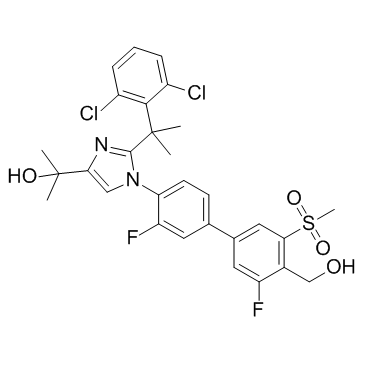| Description |
BMS-852927 is an LXRβ-selective agonist.
|
| Related Catalog |
|
| Target |
LXRβ[1]
|
| In Vitro |
BMS-852927 is an LXRβ-selective agonist with 20% LXRα and 88% LXRβ activity compared to a full pan agonist in transactivation assays. BMS-852927 is potent, with an EC50=9 nM and 26% activity in an in vitro human whole-blood endogenous target gene activation assay (WBA). BMS-852927 has similar binding affinity to LXRα and LXRβ (19 and 12 nM, respectively)[1].
|
| In Vivo |
BMS-852927, has a very favorable profile at efficacious doses in cynomolgus monkeys and mice. BMS-852927 pre-treatment of C57BL/6J mice for 7 days results in potent, dose-dependent stimulation of cholesterol efflux in this system, reaching a maximum in the 3 mg/kg/day dose group of 70% above vehicle in the initial efflux rate. Similar results are obtained in LDLR knockout (KO) mice. In a separate study, BMS-852927 inhibits the progression of atherosclerosis in a 12 week study in LDLR KO mice. Importantly, the dose response for inhibition of atherosclerosis (0.1-3 mg/kg/day) is similar to the dose response for macrophage reverse cholesterol transport (RCT) stimulation (0.03-3 mg/kg/day), a major underlying mechanism through which LXR agonists affect the disease[1].
|
| Kinase Assay |
Peritoneal macrophages are prepared from male C57BL/6 mice that are stimulated with 4% thioglycolate for 4 days. Macrophages are cultured in DMEM supplemented with 20% FBS and 100 U/mL antibiotic-antimycotic. Macrophages are incubated with LXR agonists (eg, BMS-852927) in serum-free DMEM for 20hrs, followed by 5hr treatment of LPS (20 ng/mL). The effect of agonists on IL-23α and Mertk mRNAs is determined[1].
|
| Animal Admin |
Mice[1] To study effects of LXR agonists on neutrophils, C57BL/6 mice pre-acclimated to oral dosing (n=8/group) are randomly assigned to vehicle; 0.03, 0.1, 1, or 3 mg/kg/day BMS-852927; and 0.3 or 3 mg/kg/day GW3965 and dosed orally for 3 days. Following anesthesia with isoflurane, blood is collected by retro-orbital bleeding and analyzed for neutrophil levels using an Advia hematology instrument employing peroxidase staining. Monkeys[1] All studies are performed in male animals. In a PD study, animals are randomized into six treatment groups (n=3/group) and dosed once daily with vehicle, 10 mg/kg/day T0901317, and 0.1, 0.3, 1, or 3 mg/kg/day BMS-852927 for 14 days. Blood RNA and plasma lipids are determined at baseline and days 1, 4, 7, and 14 of dosing for the pharmacodynamic (PD)study, and on days 1 and 7 for the liver triglyceride (TG)magnetic resonance spectroscopy (MRS) study.
|
| References |
[1]. Kirchgessner TG, et al. Beneficial and Adverse Effects of an LXR Agonist on Human Lipid and Lipoprotein Metabolism and Circulating Neutrophils. Cell Metab. 2016 Aug 9;24(2):223-33.
|
